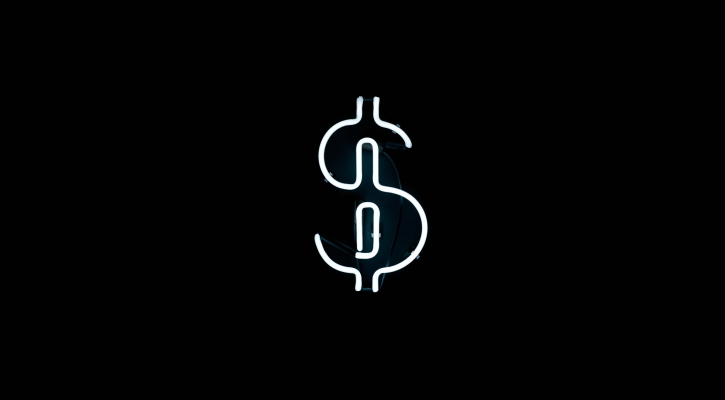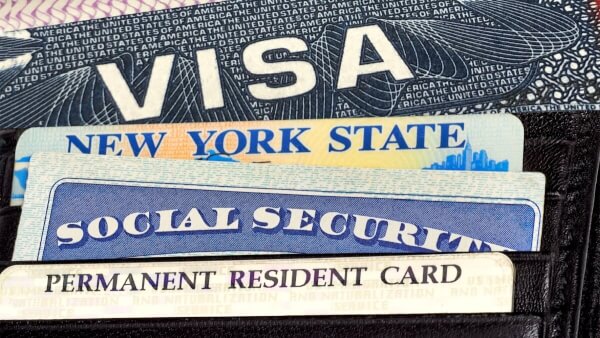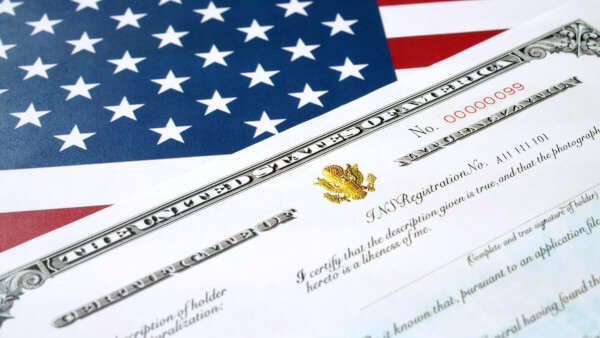Transferring your international driver's license to the US: step-by-step
Your full guide to updating your foreign driver's license to the US.

Pursuing the “American Dream” has been a goal of many people around the world for almost as long as the country has existed. There’s plenty of opportunity for hard workers to find prosperity in the states, contributing to a competitive immigration system. If you’re one of the 55,000 lucky people yearly to score a permanent resident visa, you’ll want to read on to see how to make the move as cost effective as possible.

Hiring movers to pack up and transport your things is one option for moving that can get very expensive very quickly. Instead of paying someone else, do these kinds of tasks yourself. Sure, it’ll take some time and hard work, but you can ask friends and family members to help. Additionally, it’ll encourage you to only pack the things you really need, minimizing the overall cost of your move.

Why pack up all your belongings and move them across borders? That takes a lot of money and a lot of work, and it’s just stuff that can be replaced at the other end of your move. Getting rid of everything is one of the most freeing things you can do. Things that you really can’t let go of, like photos and sentimental objects, can be packed up or stored somewhere safe, like a family member’s house.

Tying up all the loose ends in your current country is definitely one of the hardest things about an international move. It can end up costing you if you forget to cancel a subscription or pay a leftover bill, so invest some time in making sure you have everything paid and taken care of before you move.
Sit down and make a comprehensive list of all the loose ends that need tying up before you leave. As you finish them, cross them off. This will make you far less likely to forget to do something minor in the stress of the move.
Once your to-do list is written, figure out which items will come with a cost and estimate how much. Make a budget for your move so you have an idea of how much you’ll need to shell out to get to your new home.
Forgetting to cancel a gym membership or magazine subscription is money out of your pocket every month. A good hack is to look over a monthly bank statement to find things that are on autopay, and cancel everything that isn’t moving with you.
If you’re hiring movers, note that they tend to be busier and more expensive at the end of each month, when more people tend to move. More people also move in the spring and summer when the weather is nice, so housing availability might go down. Moving during the winter may mean battling the elements, but there will be less competition for housing and movers will likely have lower rates during colder months.
Estimating the cost of an international move can be tricky, but there are online calculators, like this one, that can help.

Opening a bank account in the US can sometimes be done online, but it’s simpler to visit a branch of the bank where you’re opening your new account. The bank may also ask for documents or paperwork that you don’t have as a new resident of the country. If you hit any snags setting up an account, you’re going to need to access your money some other way in the meantime.
You can always withdraw cash from ATMs, but you’ll likely be charged fees. And be careful of ATMs that offer to do the transaction in your home currency instead of US dollars -- this is often a Dynamic Currency Conversion (DCC)charge, which means the bank is converting at an unfavorable exchange rate so it can make a profit on your withdrawal. Luckily, this is easy to avoid; just choose USD as the currency you want to complete your transaction in, and calculate the conversions yourself. It takes a little more math but will save you money.
Another option for making sure your money is available once you cross the border into the US is to use a Wise multi-currency Borderless account, which allows users to send, receive and manage money in several global currencies all at once. You can then transfer money to a bank account when you need it, or use a Borderless consumer debit card, which will be available for Borderless account holders by 2018.

Unlike other countries, the US adds sales tax for purchases at the register during checkout — they’re not added into the price shown on the tag. If you make any purchases during your move, expect to pay 5-10 percent more than the price you see. This can really add up if you’re buying big-ticket items like furniture and electronics, so be sure to budget extra for these expenses.
Use our handy sales tax calculator to help keep track of sales tax.

Furnished rentals can be found in most US cities, though they tend to have higher rents than unfurnished homes. Alternatively, furnish your new home by going to a secondhand store. Furniture can be found in great condition for much less money than buying it new. Online furniture shopping is common in the US, and many stores will ship furniture to your door for free. Try Target, Walmart or Wayfair, or for used furniture, Craigslist.

In the US, your ability to rent or buy a home, secure utilities, buy a car and many other parts of day-to-day life depends on your credit score, and as an expat, you may not have credit in the US. If you’re renting your first home, it may take longer to find a landlord that will work with you without any credit, and a large deposit or co-signer may be required. Utilities may also require extra deposits. Buying a car will likely require a large down payment, and if you finance it with an auto loan, you can expect a high interest rate.

Moving a car across international borders can really add up. There are taxes and import fees to pay at the border that can amount to thousands on a newer model car. When importing a car into the US, you’re also required to have its undercarriage steam cleaned to prevent transportation of any invasive species, plus you’ll have to pay for an EPA-approved emissions test, which can cost around $1000. In most cases, you’re better off selling your car before you move and using the money to buy a new one in the US.

The US is infamous for its expensive healthcare. Make sure to secure some kind of private health insurance before you move. If you don’t and end up getting sick, injured or in an accident, without coverage, hospital costs can easily reach tens or even hundreds of thousands of US dollars.

Moving to the US with a pet is simpler than many other countries. The Centers for Disease Control and Prevention does not require quarantine for pets being imported into the country. All you need is a certificate of health from you vet, issued within 10 days of travel. Dogs need proof of rabies vaccines at least 30 days prior to the move. Cats don’t need any proof of vaccines, though rabies vaccines are recommended for them as well. If your pet looks sick, it may be turned away at the border, requiring you to pay for a veterinary examination before entry.
With these hacks in mind, your move to the US should go smoothly and be easy on your wallet. Good luck in your new home!
*Please see terms of use and product availability for your region or visit Wise fees and pricing for the most up to date pricing and fee information.
This publication is provided for general information purposes and does not constitute legal, tax or other professional advice from Wise Payments Limited or its subsidiaries and its affiliates, and it is not intended as a substitute for obtaining advice from a financial advisor or any other professional.
We make no representations, warranties or guarantees, whether expressed or implied, that the content in the publication is accurate, complete or up to date.

Your full guide to updating your foreign driver's license to the US.

Whatever your reason is for moving to the US, this guide aims to help you figure out the most important costs you'll face when you live there.

Find all you need to know about getting a personal loan for H-1B visa holders in this guide.

Everything you need to know about the US certificate of naturalization.

The US welcomes large numbers of new arrivals every year — and getting a great job to both gain experience and set down roots is a core part of the American...

Find everything you need to know about the US citizenship test, including the USCIS questions and answers.